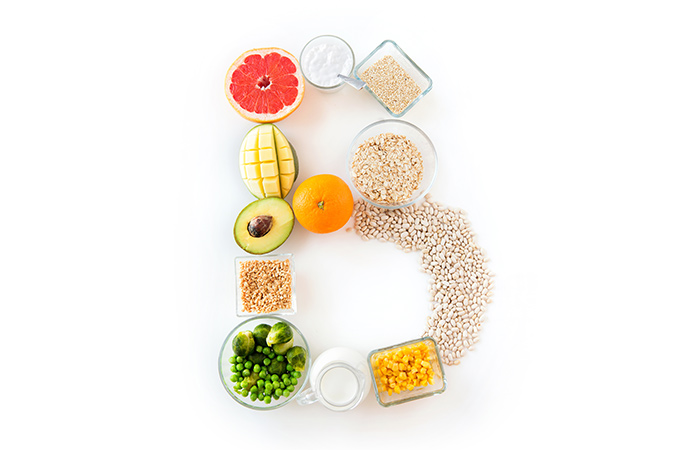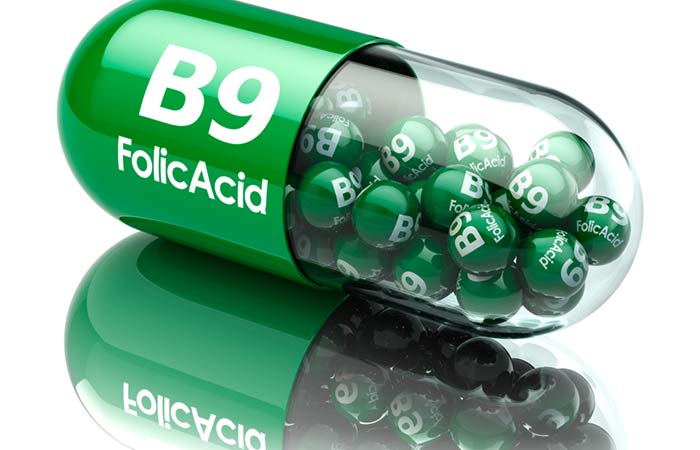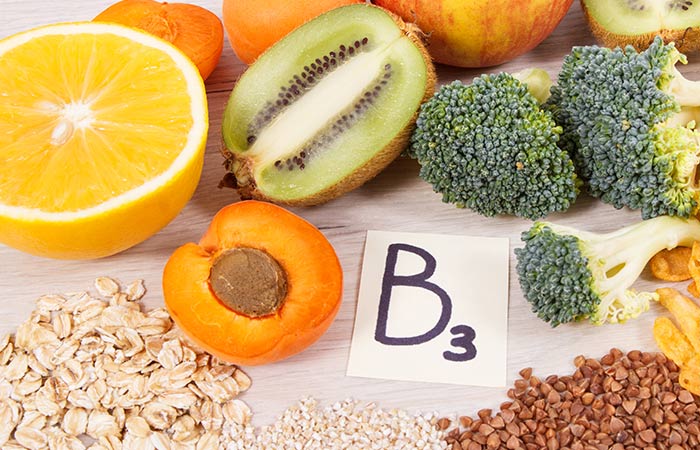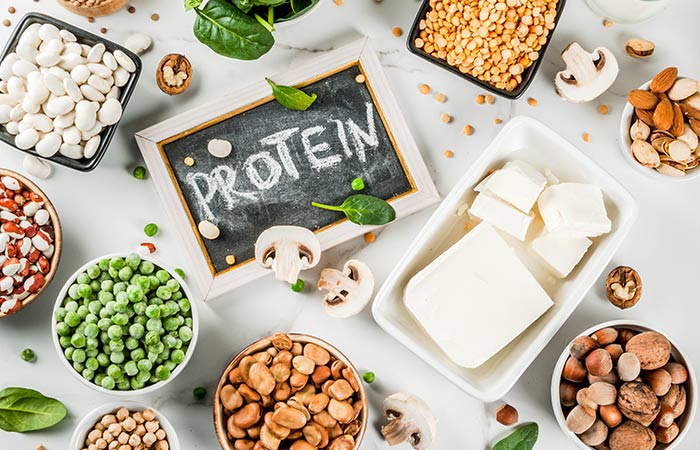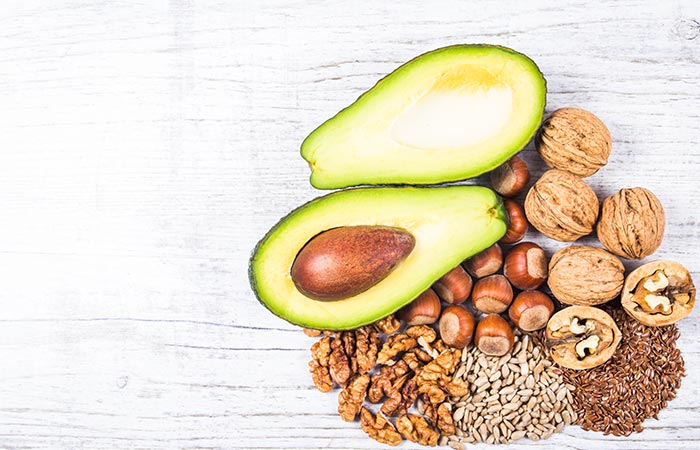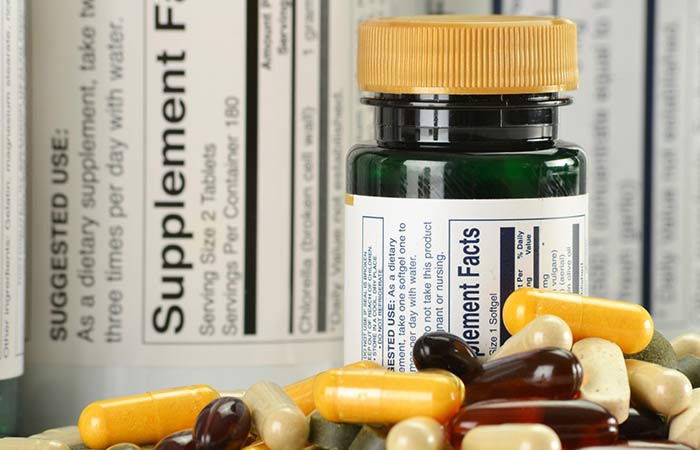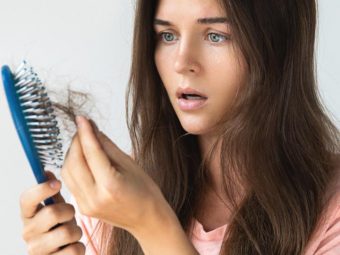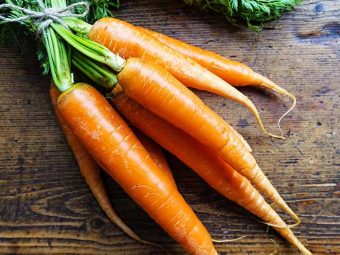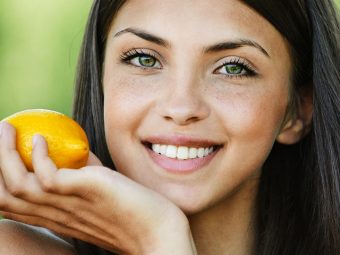5 Essential Vitamins For Hair Growth To Include In Your Diet
Incorporate the most crucial vitamins for hair and scalp health in your diet.
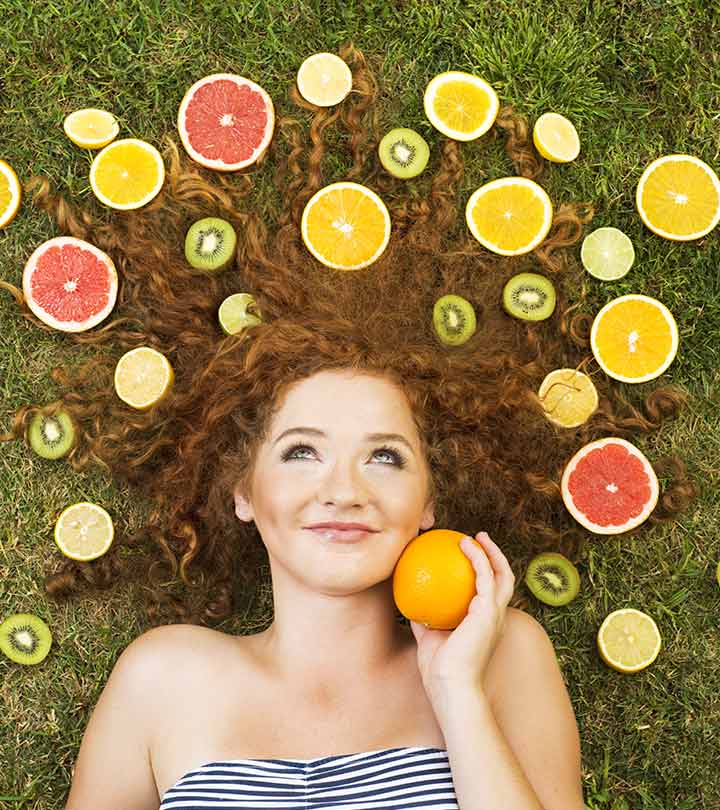
Most of us find it difficult to grow thick, long hair. Trying hair care treatments means regularly shelling big bucks, which is not a feasible option for many. But, there is a remedy – using vitamins for hair growth. That’s right! Instead of heading to salons for regular hair maintenance and care treatments, eating the right vitamins can improve your hair health. Don’t believe us? Keep reading to know more.
While it is necessary to visit your hairdresser, take care of your hair, and be patient, we often overlook the importance of nutrition.
When people say that healthy hair is a trait of good health, they are correct. Both good health and healthy hair result from a well-balanced diet that includes the proper proportions of fats, carbohydrates, vitamins, proteins, minerals, water, and fiber.
Proteins, minerals, and vitamins are the three most critical nutrients for hair. Their consumption in the correct amounts results in rapid and healthy hair growth. The appropriate diet is 90% of what you need to do to grow the long, beautiful hair you desire.
Take a look at the list of vitamins and minerals listed below to see how they help you grow healthy hair. Keep reading to know more!
In This Article
5 Essential Vitamins For Hair Growth
1. Vitamin A
Vitamin A is one of the four fat-soluble vitamins. Studies show that it plays an important role in the development of epithelial tissues, including skin, hair, and sebaceous glands. Sufficient vitamin A intake results in optimal sebum production, which helps moisturize the scalp for healthy hair growth (1).
Another study shows that deficiency of vitamin A may lead to alopecia (2).
Although it is important to get enough vitamin A, excess of it can also reduce the number and length of hair follicles and lead to hair loss (1).
Foods Rich In Vitamin A (3)
- Sweet potatoes
- Carrots
- Milk
- Spinach
- Dried apricots
- Mangoes
2. B Vitamins
i. Vitamin B12
According to Dr. K. Harish Kumar, MD, DVL, vitamin B12 plays a vital role in the formation of red blood cells. These red blood cells carry oxygen to all body tissues, including the hair (4).
Studies show that there is potential for optimal hair growth if the vitamin B12 levels are within the normal range (5).
Foods Rich In Vitamin B12 (4)
- Cheese
- Whey powder
- Milk
- Yogurt
ii. Biotin
Biotin is known as the “hair growth vitamin.” It is one of the 12 vitamins in the vitamin B family.
A study was conducted to evaluate the efficacy of biotin in hair growth. Results showed that 18 patients with poor hair and nail growth exhibited improvement after receiving biotin (6).
Biotin deficiency may cause uncombable hair among children (6). Other symptoms include thinning hair and hair loss all over the body (7), (8).
However, there is a lack of data regarding the effectiveness of biotin among healthy individuals.
Foods Rich in Biotin (7)
- Mushrooms
- Avocados
- Eggs
- Peanut butter
- Yeast
- Sunflower seeds
- Sweet potato
- Cauliflower
- Raspberries
- Bananas
- Walnuts
- Almonds
iii. Folic Acid (Folate)
Folate is a water-soluble B vitamin. Folic acid is a fully oxidized form of vitamin that is used in dietary supplements.
It helps generate red blood cells, which ensures transportation of oxygen to all the tissues, including those that build hair. It is responsible for rebuilding hair follicle cells and preventing graying of hair and hair fall (9).
Foods Rich In Folate (9), (10)
- Kale
- Spinach
- Black-eyed peas
- Lettuce
- Brussels sprouts
- Green peas
- White beans
- Asparagus
- Beets
iv. Niacin
Niacin, also known as vitamin B3, is a water-soluble B vitamin. Studies show that its derivatives, octyl nicotinate and tetradecyl nicotinate, help increase hair fullness in females (11). However, more studies are warranted to establish this.
Foods Rich In Niacin (12)
- Marinara spaghetti sauce
- Brown rice
- Peanuts
- Potato
- Sunflower seeds
3. Vitamin C
Vitamin C is also known asascorbic acid. It is a water-soluble mineral that is naturally present in some foods. It is an important physiological antioxidant that regenerates other antioxidants within the body, including vitamin E.
Studies are ongoing to find out if vitamin C restricts the damaging effects of free radicals through its antioxidant content that helps reduce oxidative stress, which can prevent or delay the development of certain cancers (13). This blockage of oxidative stress can also reduce the aging of hair (14).
In addition to that, studies show that insufficient vitamin C intake can cause scurvy. As a result, there may be bleeding around hair follicles and corkscrew hairs (15).
Foods Rich In Vitamin C (13)
- Lemon
- Guava
- Mandarin
- Strawberries
- Grapefruit
4. Vitamin D
Vitamin D is a fat-soluble vitamin. Its other names include calciferol (vitamin D3), cholecalciferol, ergocalciferol (vitamin D2), and ergosterol (provitamin D2).
It plays an important role in calcium regulation, healthy immune function, and cell growth.
Research shows that decreased levels of vitamin D may cause alopecia areata. Its deficiency may disturb the normal postnatal hair follicle cycle (16).
Another study has found that the topical application of vitamin D analog (synthetic vitamin D ointment that you rub on your skin) can treat alopecia areata (17).
Vitamin D supplementation can be therapeutic for patients with alopecia areata, female pattern hair loss, or telogen effluvium (16). However, further studies with larger groups of patients are required to evaluate the role of vitamin D supplementation in alopecia.
The actual relationship between vitamin D and hair growth is unknown. Although our body produces vitamin D naturally after exposure to sunlight, you can find it in the following foods.
Foods Rich In Vitamin D (18)
- Cheese
- Milk
- Yogurt
5. Vitamin E
Vitamin E is a group of fat-soluble compounds with rich antioxidants. It exists in various chemical forms, of which tocopherol is the only form that can be consumed by humans.
A study was conducted to investigate the effect of tocopherol on 21 subjects with hair loss. The results showed that there was a significant improvement in the number of hairs on the participants at the end of the 8-month trial period. This is because the antioxidant activity of tocotrienols helped reduce oxidative stress in the scalp (19).
Foods Rich In Vitamin E (20)
- Almonds
- Peanuts
- Cooked spinach
- Sunflower seeds
- Dried herbs
Besides these five vitamins, there are two minerals that can also help your hair grow. Check them out below!
2 Essential Minerals For Hair Growth
1. Iron
Iron is an essential mineral that supports metabolism as it helps red blood cells carry oxygen to the tissues. It is necessary for the growth, development, and cellular functioning of your body.
Research shows that 30% of women experience persistent hair shedding and reduced hair volume due to depleted iron stores in the body before the age of 50 (21), (22).
Iron deficiency is seen as one of the causes of hair loss in women with female pattern hair loss (23), (24), (25).
Foods Rich In Iron (26)
- Breakfast cereals
- Lentils
- Kidney beans
- Spinach
- Raisins
- Apricots
- Tofu
2. Zinc
Zinc is an essential mineral that plays an important role in immune function, cell division, growth, and development.
Studies have shown that zinc deficiency causes hair loss (27), (28). Oral zinc supplements can be of great help for alopecia areata patients with low zinc levels (29).
Although zinc supplements can help improve hair loss, there are no studies that have found a direct link between them.
Foods Rich In Zinc (27)
- Nuts
- Pumpkin seeds
- Cashews
- Chickpeas
- Sweet potatoes
- Spinach
There are also some macronutrients that you can include in your diet to increase your hair growth. Find out more about them in the next section.
Essential Macronutrients For Hair Growth
1. Proteins
Proteins are macronutrients that are found throughout the body, including the muscles, skin, bone, and hair. Although there are limited studies on the efficacy of protein for hair growth in humans, animal studies show that protein deficiency can cause hair loss (30), (31).
High-Protein Foods For Hair Growth (32)
- Dates
- Greens
- Milk
- Paneer
- Sprouts
- Nut milk and nut butter
- Quinoa
- Lentils
- Beans
- Greek yogurt
2. Omega-3 And Omega-6 Fatty Acids
Omega-3 and omega-6 fatty acids are essential fats that are not produced by our body. They need to be consumed through foods.
Deficiency of omega-3 and omega-6 fatty acids can result in loss of scalp hair. Research also shows that arachidonic acid, an omega-6 fatty acid, may promote hair growth (33).
Foods Rich In Omega-3 Fatty Acids (34)
- Flax seeds
- Canola oil
- Chia seeds
- Walnuts
- Soybeans
Foods Rich In Omega-6 Fatty Acids (35)
- Potato
- Nuts
- Seeds
- Mayonnaise
Following a healthy and balanced diet is the best way to increase your intake of all these vitamins, minerals, and macronutrients. But if you are at risk of deficiency, you can opt for vitamin supplements as well.
Vitamin Supplements For Faster Hair Growth
Supplements are nothing but products that contain a mix of various vitamins and minerals in the right quantities. Consumption of a supplement for faster hair growth saves time as you do not have to spend time looking for the appropriate food sources. Just make sure that you consult a healthcare professional before you start using any supplements.
Long and luscious hair will not remain an elusive dream as long as you consume foods that provide you with the right nutrition required for healthy hair. Growing your hair becomes easier when you make certain lifestyle changes.
What you eat impacts your hair. When you eat a balanced diet filled with vitamins, minerals, proteins, and other nutrients, your hair looks and feels healthier. The essential vitamins for hair growth you should add to your diet are vitamins A, B, C, D, and E. You should also consume minerals like iron and zinc to keep your hair healthy. Macronutrients like proteins and omega-3 and 6 fatty acids are important for hair health too.
You can also consume vitamin and mineral supplements to prevent any hair issues due to nutrient deficiencies. You should also maintain a healthy lifestyle by sleeping on time, being active, and practicing stress-relieving techniques.
References
- “Endogenous retinoids in the hair follicle and sebaceous gland” HSS Author Manuscript, US National Library of Medicine National Institutes of Health.
- “Clinical signs of anemia in vitamin A-deficient rats” The American journal of clinical nutrition, US National Library of Medicine National Institutes of Health.
- “10 Foods That Promote Healthy Hair” Sylvain Melloul International Hair Academy
- “Vitamin B12” National Institute Of Health, U.S. Department of Health & Human Services
- “Management of hair loss in women” Dermatologic clinics, US National Library of Medicine National Institutes of Health.
- “A Review of the Use of Biotin for Hair Loss” Skin appendage disorders, US National Library of Medicine National Institutes of Health.
- “Biotin” National Institute Of Health, U.S. Department of Health & Human Services
- “Biotin and biotinidase deficiency” Expert review of endocrinology & metabolism, US National Library of Medicine National Institutes of Health.
- “Nutrition of women with hair loss problem during the period of menopause” Menopause review, US National Library of Medicine National Institutes of Health.
- “Folate” National Institute Of Health, U.S. Department of Health & Human Services
- “A pilot study evaluating the efficacy of topically applied niacin derivatives for treatment of female pattern alopecia.” Journal of cosmetic dermatology, US National Library of Medicine National Institutes of Health.
- “Niacin” MedlinePlus, U.S. National Library of Medicine
- “Vitamin C” National Institute Of Health, U.S. Department of Health & Human Services
- “Oxidative Stress in Ageing of Hair” International journal of trichology, National Center for Biotechnology Information, U.S. National Library of Medicine
- “Vitamin C Deficiency (Scurvy)” National Center for Biotechnology Information, U.S. National Library of Medicine
- “The Role of Vitamin D in Non-Scarring Alopecia” International journal of molecular sciences, National Center for Biotechnology Information, U.S. National Library of Medicine
- “Successful Treatment of Alopecia Areata with Topical Calcipotriol.” Annals of dermatology, National Center for Biotechnology Information, U.S. National Library of Medicine
- “Vitamin D” National Institute Of Health, U.S. Department of Health & Human Services
- “Effects of tocotrienol supplementation on hair growth in human volunteers.” Tropical life sciences research, US National Library of Medicine National Institutes of Health
- “Vitamin E” National Institute Of Health, U.S. Department of Health & Human Services
- “Causes of hair loss and the developments in hair rejuvenation.” International journal of cosmetic science, National Center for Biotechnology Information, U.S. National Library of Medicine
- “Low iron stores: a risk factor for excessive hair loss in non-menopausal women.” European journal of dermatology, National Center for Biotechnology Information, U.S. National Library of Medicine
- “Iron Plays a Certain Role in Patterned Hair Loss” Journal of Korean medical science, National Center for Biotechnology Information, U.S. National Library of Medicine
- “Iron deficiency in female pattern hair loss, chronic telogen effluvium, and control groups.” Journal of the American Academy of Dermatology, National Center for Biotechnology Information, U.S. National Library of Medicine.
- “Diffuse hair loss in an adult female: approach to diagnosis and management.” Indian journal of dermatology, venereology and leprology, National Center for Biotechnology Information, U.S. National Library of Medicine.
- “Iron” National Institute Of Health, U.S. Department of Health & Human Services
- “Zinc: an essential micronutrient” American family physician, National Center for Biotechnology Information, U.S. National Library of Medicine.
- “Zinc” National Institute Of Health, U.S. Department of Health & Human Services
- “The Therapeutic Effect and the Changed Serum Zinc Level after Zinc Supplementation in Alopecia Areata Patients Who Had a Low Serum Zinc Level” Annals of dermatology, National Center for Biotechnology Information, U.S. National Library of Medicine.
- “Protein deficiency in a colony of western lowland gorillas (Gorilla g. gorilla)” American Association of Zoo Veterinarians, National Center for Biotechnology Information, U.S. National Library of Medicine.
- “Effects of different dietary protein levels and DL-methionine supplementation on hair growth and pelt quality in mink (Neovision vision).” Journal of animal physiology and animal nutrition, National Center for Biotechnology Information, U.S. National Library of Medicine.
- “Protein in diet” MedlinePlus, U.S. National Library of Medicine
- “Diet and hair loss: effects of nutrient deficiency and supplement use” Dermatology practical & conceptual, National Center for Biotechnology Information, U.S. National Library of Medicine.
- “Omega-3 Fatty Acids” National Institute Of Health, U.S. Department of Health & Human Services
- “Table 2. Food sources of total omega 6 fatty acids (18:2 + 20:4), listed in descending order by percentages of their contribution to intake, based on data from the National Health and Nutrition Examination Survey 2005-2006” Identification of Top Food Sources of Various Dietary Components, National Cancer Institute, National Institute Of Health, U.S. Department of Health & Human Services




